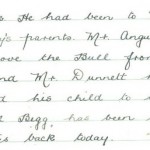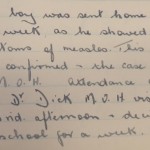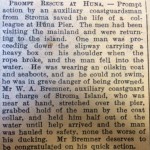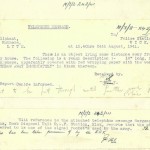This week, German forces continued to advance on Leningrad in northern Russia, aided by a Finnish army which took the opportunity to re-establish the border between the two countries which had existed before the Russian invasion last winter. Leningrad was now in range of German artillery, which began shelling the city. In Germany, Hitler ordered the temporary suspension of the practice of euthanizing the mentally handicapped, following protests.
 In Caithness, the bull was still preventing poor Frank Dunnett from going to Brabster
In Caithness, the bull was still preventing poor Frank Dunnett from going to Brabster  School. The head teacher recorded the current stalemate in the log book on 22 August: “Frank Dunnett is still absent. Constable Gunn, Mey, called on Friday afternoon of last week. He had been to Mr Angus and the boy’s parents. Mr Angus has refused to remove the bull from the open moor, and Mr Dunnett has refused to send his child to school.”
School. The head teacher recorded the current stalemate in the log book on 22 August: “Frank Dunnett is still absent. Constable Gunn, Mey, called on Friday afternoon of last week. He had been to Mr Angus and the boy’s parents. Mr Angus has refused to remove the bull from the open moor, and Mr Dunnett has refused to send his child to school.”
 As if the Luftwaffe and fierce animals weren’t enough, Bilbster School faced a new threat this week: “August 22nd: One boy was sent home on Tuesday of this week as he showed all the symptoms of measles. This has since been confirmed & the case reported to the M.O.H. [Medical Officer of Health]… Dr Dick M.O.H. visited the school on Friday afternoon & decided to close the school for a week.”
As if the Luftwaffe and fierce animals weren’t enough, Bilbster School faced a new threat this week: “August 22nd: One boy was sent home on Tuesday of this week as he showed all the symptoms of measles. This has since been confirmed & the case reported to the M.O.H. [Medical Officer of Health]… Dr Dick M.O.H. visited the school on Friday afternoon & decided to close the school for a week.”
The John O’Groat Journal reported how an auxiliary coastguardsman from Stroma saved the  life of one of his colleagues at Huna Pier. “One man was proceeding down the slipway carrying a heavy box on his shoulder when the rope broke, and the man fell into the water … and as he could not swim, he was in grave danger of being drowned.” Mr W.A. Bremner reached down and “grabbed hold of the man by the coat collar, and held him half out of the water until help arrived.”
life of one of his colleagues at Huna Pier. “One man was proceeding down the slipway carrying a heavy box on his shoulder when the rope broke, and the man fell into the water … and as he could not swim, he was in grave danger of being drowned.” Mr W.A. Bremner reached down and “grabbed hold of the man by the coat collar, and held him half out of the water until help arrived.”
 The Wick Police incident report centre received a call on 24 August from Mr Oliphant of Ruthers, Lyth: “There is an object lying some distance away from my house. The following is a rough description: 10 inches long, round in shape, apparently covered with red wrapping paper with the words “THROW AWAY IMMEDIATELY” in black thereon.” R.A.F. Wick Bomb Disposal reported that the object was “one of the signal rockets used by the army”, and was now in the possession of the R.A.F.
The Wick Police incident report centre received a call on 24 August from Mr Oliphant of Ruthers, Lyth: “There is an object lying some distance away from my house. The following is a rough description: 10 inches long, round in shape, apparently covered with red wrapping paper with the words “THROW AWAY IMMEDIATELY” in black thereon.” R.A.F. Wick Bomb Disposal reported that the object was “one of the signal rockets used by the army”, and was now in the possession of the R.A.F.
Over on Orkney, Hetty Munro of Thurso gave a pen portrait in her diary of a staff planning session: “Inside the blinds were drawn, maps had been pinned up on the wall and strewn over the tables and the staff were arguing over a [Counter Attack] plan in the corner. Soon, the door opened and General Kemp and the Army Commander along with two or three Generals came in – booted and spurred and the whole scene began to look rather like war as seen by Hollywood. The flickering light from the storm lanterns, the earnest faces of the army officers bent over the maps, the low voices… the whole set up gave one an eerie feeling of WAR at its grimmest. I also felt that if this was going to be the form when the blitz really started, one could feel pretty confident that one was on the right lines – and the right side.”
